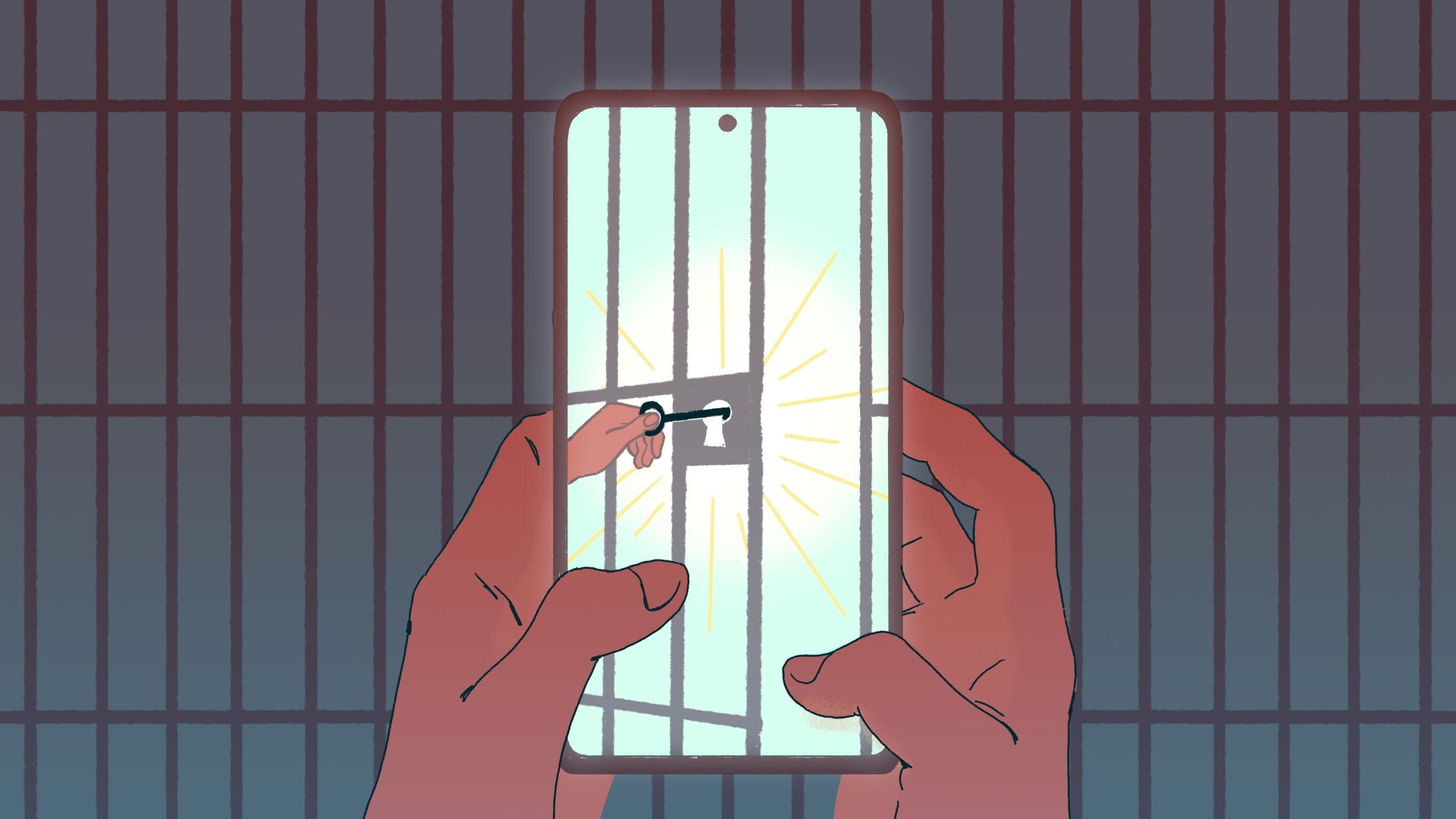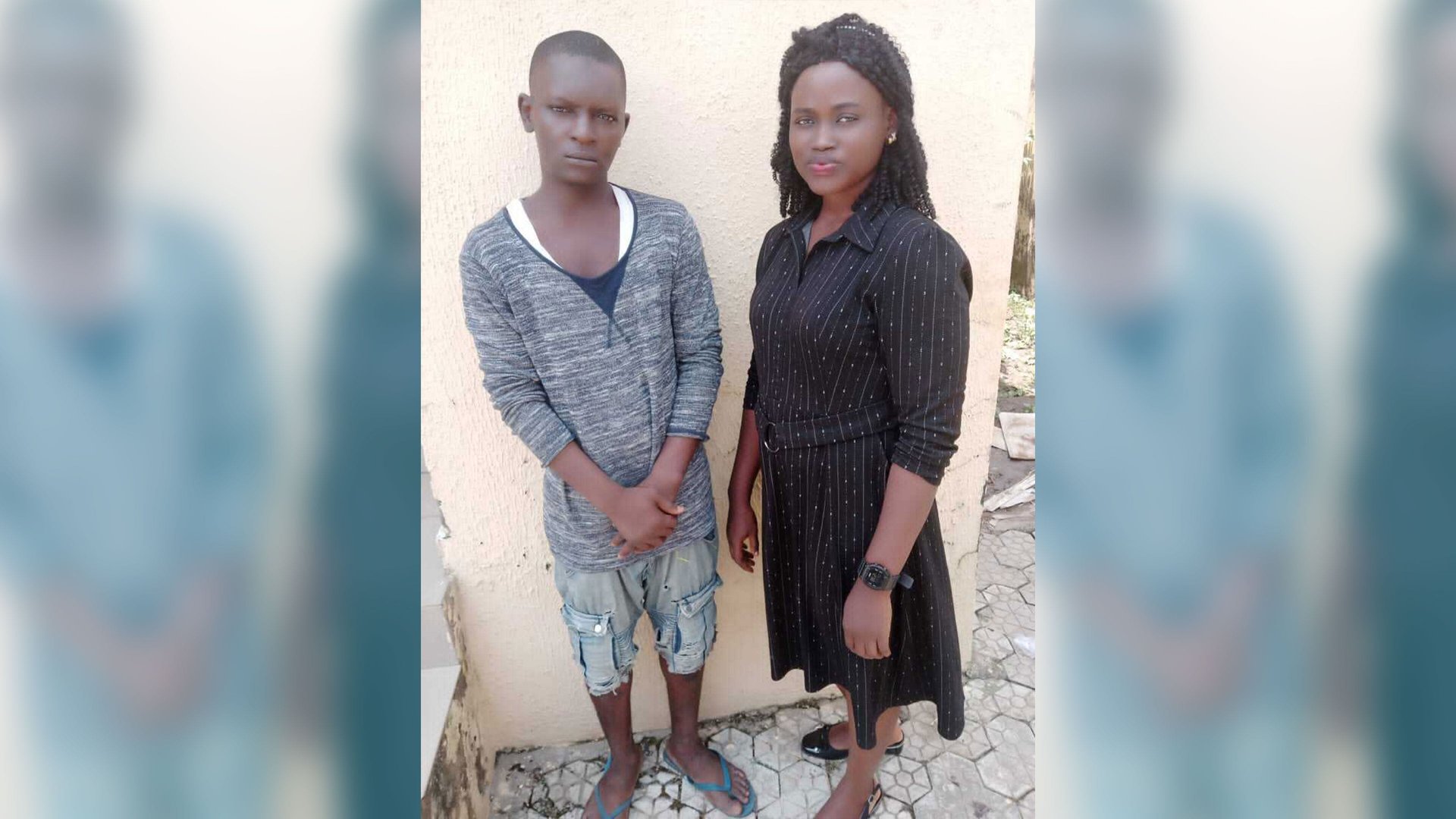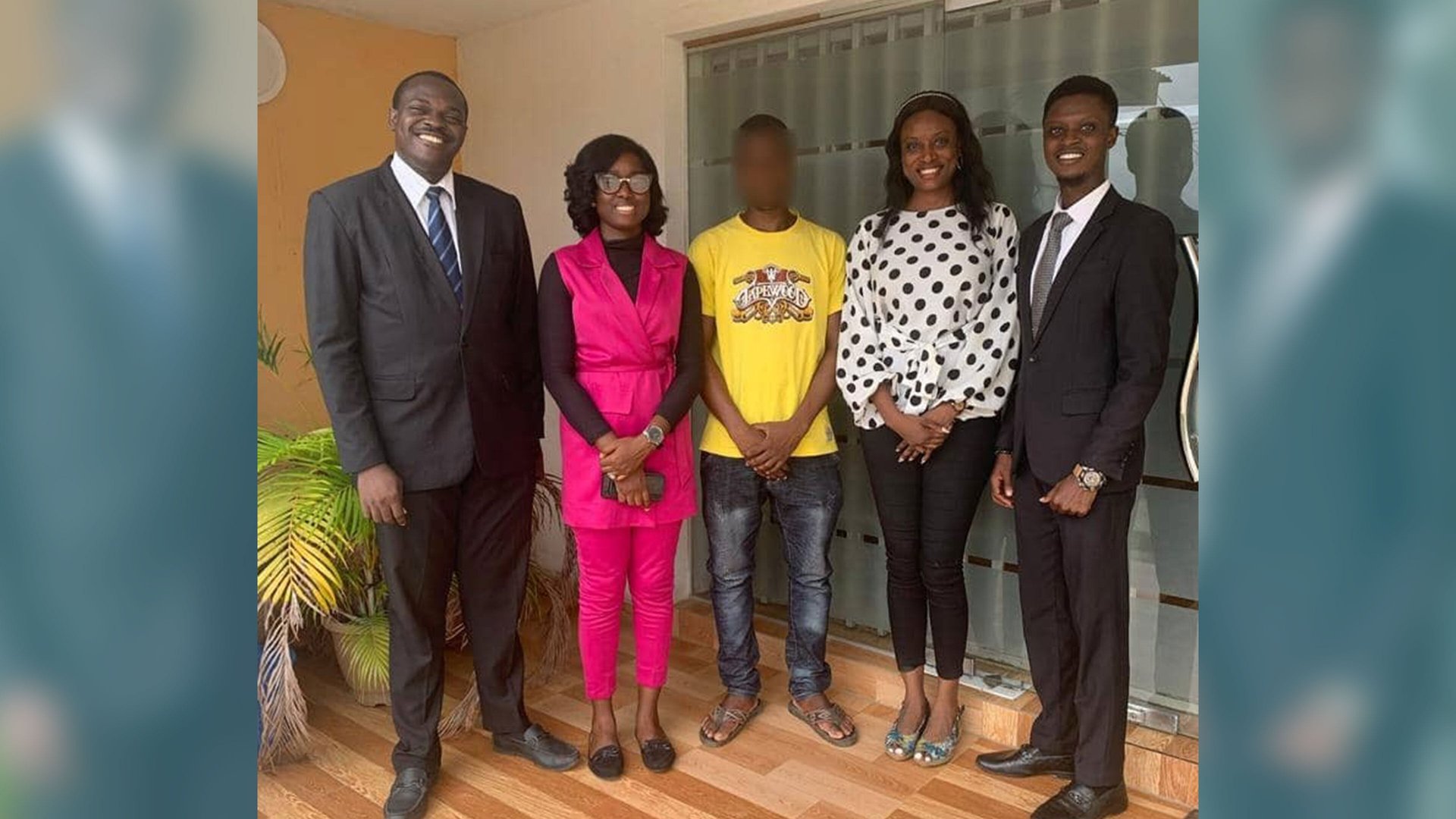A Nigerian app is saving lives by connecting people to pro bono legal services
Gavel is using technology and a network of volunteers to take on a justice system plagued by corruption and dysfunction

ABUJA - In October 2021, Shola Usman was arrested and held without charge for eight months in a prison cell in Mabushi Police Station in Abuja, Nigeria. Four months later, a court ordered that assets worth millions of naira (1USD= 908 Naira) belonging to the 44-year-old mother of six be confiscated while she was in arbitrary detention. She had not appeared before a judge.
Suggested Reading
It was not until June 2022 that she was released from custody on bail, after Nigeria’s Inspector General of Police was made to intervene through an official petition by her lawyer.
Related Content
Usman, an agricultural entrepreneur who farms staples like rice and maize and sells them to wholesalers and retailers, was accused of defrauding the wife of a powerful politician. She denied all accusations, but still paid the price.
“The politician,” Usman told Quartz, “had the money to drag me from court to court, and used his influence to obtain a court order to freeze my bank accounts, claiming that I committed fraud.” She did not wish to reveal the identity of the politician for fear of further reprisal.
Nigeria, which ranked 150 out of 180 countries surveyed in Transparency International’s 2022 corruption perception index, see graft as resulting in the “perversion of justice, wrongful convictions, and acquittals of guilty parties,” according to the International Bar Association, a 75-year-old organization that aims to protect and advance the rule of law globally. In a recent report, the association said that corruption “weakens the judiciary and other law enforcement agencies, as corrupt officials can be easily manipulated or bribed,” compromising the delivery of justice.
Furthermore, official statistics by the Nigerian Correctional Service indicate another fault with the rule of law in Africa’s most populous country: In 2023, 69% of the 77,849 inmates in Nigeria were pre-trial detainees, including Usman, who was held in a police station for eight months. Based on this fact, Nigeria’s Inspector General of Police intervened to order her release.
In 2017, human rights lawyer Nelson Olanipekun set out to fix this. He established Citizens Gavel Foundation for Social Justice (Gavel), a civic tech organization aimed at improving the pace of justice delivery through the use of technology. Gavel focuses on indigent victims of injustice and uses an online platform to connect inmates trapped in a judicial limbo with lawyers willing to help.
“The initiative was born from a personal experience a long time ago when my father desperately needed legal aid but was only able to get it through a lawyer who had volunteered to stand in for him,” Olanipekun told Quartz.
Slow justice is no justice

At her arrest, Usman alleges that policemen raided her home and took two vehicles, then stormed her mobile shop and warehouse, and carted away merchandise and thousands of sacks of produce.
Stranded in a legal purgatory, Usman told Quartz she “endured inhumane treatment while in detention,” including getting hit on the head, and was left to bleed for days, and being “blackmailed” and “hounded by the politician’s loyal policemen.”
Quartz reached out for comment to officers at the Mabushi Police station where Usman was held. The reporter was told that officers are not at liberty to speak to the media and advised to file an official request for comment, which could take months to respond to.
In comments made last year, Nigeria’s Inspector-General of Police vowed to punish erring police officers who fail to abide by the law enforcement mandate and uphold the constitution. But the country’s war on terror has often led to a culture where excessive use of force is rampant.
These slow processes and limited access to justice are what inspired Gavel, says Olanipekun.
After resigning from a career as a corporate lawyer, Olanipekun started spending his days visiting prisons and police stations, where he spoke to people who were unjustly detained in an effort to help secure their release by representing them in court, he recalls.
But even before he started Gavel, which operates in Nigeria and the United Kingdom, Olanipekun dabbled in pro bono work.
He remembers the case of three orphaned young boys in a remote village in Anambra State in southwest Nigeria, who vandalized the roof of the house they inherited from their parents to prevent their uncles from taking the building.
“This was between 2011 and 2012. They were underage and didn’t know what to do when their uncles had them arrested,” says Olanipekun, who attended every court hearing in the boys’ case until he managed to get them out.
A 2023 field study by The Hague Institute for Innovation of Law (HiiL), an international non-government organization committed to people-centered justice, found that 81% of Nigerians experienced at least one legal problem in the past year, with many facing multiple problems mostly related to disputes with neighbors, domestic violence, land disputes, crime, and housing issues.
“The difficulty in gaining timely justice in Nigeria was what inspired Gavel and later [the] Podus application which launched in 2021,” says Olanipekun.
“Podus connects any person in need of legal aid with an available pro bono lawyer near them so that in the shortest possible time, they can get justice,” he explained.
How Podus connects people to pro bono legal help

The simple interface, which started as a mobile application before shifting online as a web app, requires complainants to sign up, then fill out an online form where they select one of nine categories including rape, extortion, domestic abuse or defamation, select the region, then describe details of their case and add their name and contact information.
Clients are then connected to one of Gavel’s network of 200 volunteer lawyers in their vicinity all over Nigeria, who take on their case in return for appearance fees and stipends to cover basic costs, which Gavel pays through funds donated by sponsors, partners, and agencies like Osiwa, Luminate, Civic Hive, Trust Africa and BudgIT. Partnering lawyers are thoroughly vetted through an extensive examination of their record as human rights advocates and their contribution to their local bar associations.
According to Adewole Ibukun, Head of Procurement at Gavel, the organization has helped release over 5,000 pretrial detainees.
“Many of them were remanded in custody because they didn’t have a lawyer,” Ibukun told Quartz. “Others are summarily locked up by police for crimes they did not commit, in which case Gavel facilitates their bail.”
A 2021 Centre for Democracy and Development (CDD) report about Nigeria’s human rights record over the last two decades supports Ibukun’s statements.
The report highlights unlawful detention as a persistent human rights violation, whereby “citizens continue to be unlawfully detained under harrowing pre-trial detention for years without formal charges being brought against them,” noting that Nigerian police routinely charge suspects with grave offenses to detain them while making little effort to investigate or prosecute the cases.
A tech-assisted lifeline at a critical human moment
Gavel’s services were a lifeline for Shola Usman, who,, had lost access to her bank accounts and was forced to borrow to stay out of prison. Usman herself — a wealthy business owner — doesn’t technically fit the traditional profile of Gavel’s pro bono clients. But the company made an exception, as she had been left with no access to her own funds.
“A friend sent me the link on WhatsApp and as soon as I created my case I was assigned to Barrister Oluwaseyi Arowosebe. Gavel has been supporting me since August 2022,” said Usman.
Despite its complexity, Usman’s case appears simple compared to that of Daniel Jagaba, a 51-year-old father of three who was falsely accused of rape in 2017.
Jagaba, who was precariously employed in menial work like house-painting and carpentry, was released soon after his arrest for lack of sufficient evidence.
“But the police officer who was investigating the case rearrested me and demanded a bribe of 50,000 naira [equivalent of $137 at the time] to grant me bail,” Jagaba told Quartz. “When I failed to raise the money, I was kept in pre-trial detention pending the transfer of my case to an appropriate court.”
When the case was filed at a High Court, the trial lingered between 2018 and 2019. Then, the covid pandemic broke out, delaying proceedings another two years, Jagaba said, at which point the case was moved to another high court presided over by a new judge who restarted the trial.
“I was in prison when the Gavel team visited to offer their pro bono services. My lawyer had abandoned me after stripping me of what little money I had, so I asked for their help and told them my story,” he said.
“When Gavel eventually started to follow up on my case, the corrupt prosecutor, who I found out while in detention had conspired with the policeman, stopped attending the court hearings,” Jagaba said.
Jagaba’s Gavel-appointed lawyer made several attempts to strike down the case for want of diligent prosecution, until Jagaba was finally acquitted and discharged in October 2022.
A path to change
Lawyer and Gavel’s legal representative in Abuja, Abioye Mosunmola, cites procedural bottlenecks as a reason behind the slow legal processes.
“Judges still write in longhand during court proceedings, and there are many other outdated practices,” Mosunmola told Quartz.
“Gavel’s tech initiatives propose the infusion of tech into court processes to make it easier for lawyers to carry out their legal tasks, and for judges to dispense justice,” Oluwaseyi Arowosebe, a lawyer and consultant with Gavel, told Quartz.
“The police arbitrarily arrest innocent citizens and detain them for weeks and months without a remand warrant and without charging them to court,” said Arowosebe. “Corrupt judges sell justice to the highest bidders, and innocent people are robbed of their fundamental human rights by state actors who have no respect for the rule of law.”
In a collaboration between Gavel and the National Judicial Council (NJC) in 2022, the Oyo State Judiciary deployed the Nigeria Case Management System, a web platform that seeks to automate case flow management in the courts to facilitate the safe electronic exchange of documents between the different court levels.
In Lagos, Gavel partnered with the Lagos State Ministry of Justice to deploy the Justice Clock, which gives complainants access to their case files and legal advice online.
But these initiatives are no panacea for the country’s systemic challenges to the rule of law.
The corruption and dysfunction that plagues Nigeria’s legal system has been thoroughly documented, in particular the human rights violations committed by the now defunct Special Anti-Robbery Squad (SARS), a unit of the Nigerian police tasked with fighting violent crimes.
In October 2020 the #EndSARS campaign in which Gavel took part, saw at least 56 people killed by excessive use of force by the police and military, leading to the disbandment of the unit by presidential decree within days.
But other pro-democracy actions were met with resistance, according to Nelson Olanipekun, Gavel’s founder, citing his organization’s recent bid to report what it calls“compromised” Court of Appeal judges to the National Judicial Council (NJC), the constitutional body responsible for disciplining errant judges.
Quartz received a copy of the NJC’s acknowledgement that it had received Gavel’s Nov. 28 petition regarding the “recklessness and gross abuse of the revised judicial code of conduct for judicial officers” in Nigeria, informing Gavel that “action is being taken.”
“Yet despite the assurances, the NJC still promoted the accused judges to the Supreme Court,” said Olanipekun.
“The repressive nature of state actors is one hell of a problem to contend with,” said Olanipekun.
This story is published in collaboration with Egab.